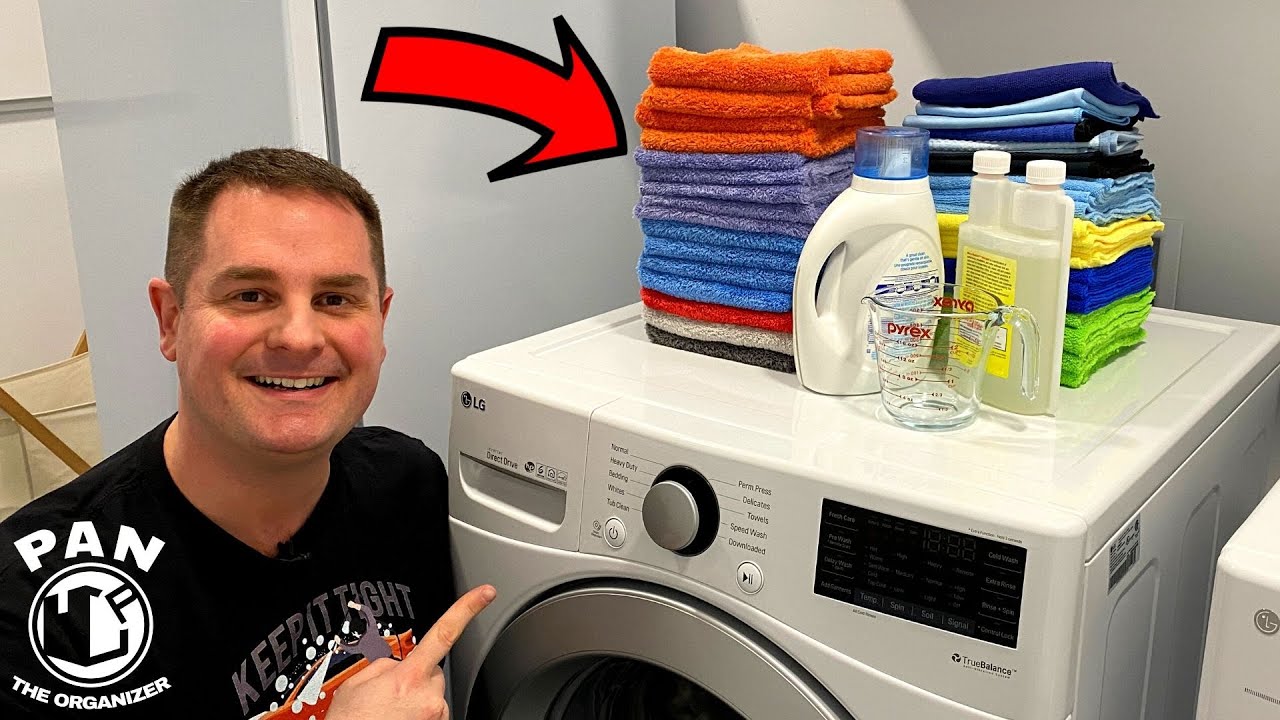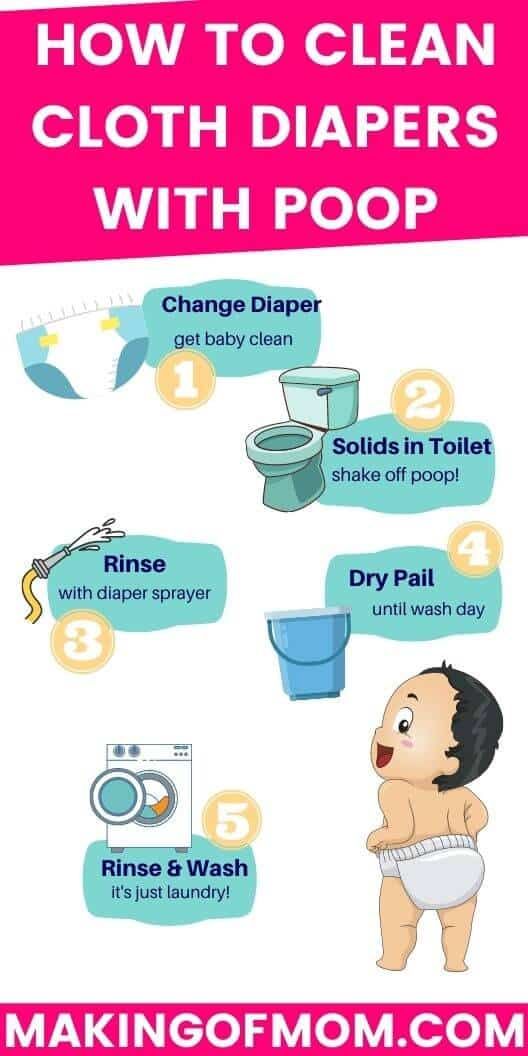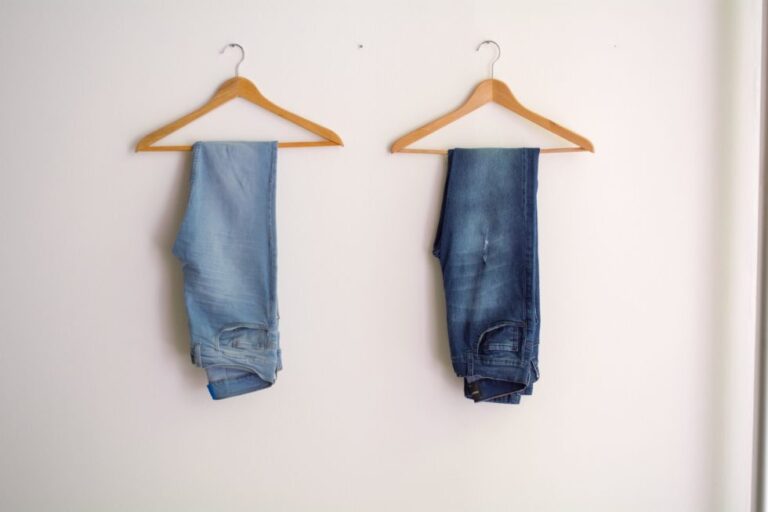How to Clean Microfiber Cloth in Washing Machine: Quick Tips
To clean a microfiber cloth in a washing machine, use warm water and a gentle, liquid detergent. Avoid fabric softeners and bleach to prevent damage.
Microfiber cloths have become indispensable in our daily cleaning routines, thanks to their ability to trap dust, dirt, and even microscopic particles with ease. Known for their durability and super absorbency, these cloths are a go-to for eco-friendly cleaning enthusiasts and professionals alike.
Ensuring their longevity requires proper care, especially when it comes to washing. Many might not realize the importance of the correct cleaning method to maintain the cloth’s effectiveness. This guide aims to demystify the process, providing a straightforward approach to keeping your microfiber cloths in top condition, ready to tackle any cleaning challenge that comes their way.
Introduction To Microfiber Cloths
Microfiber cloths are a staple in modern cleaning. These cloths consist of ultra-fine fibers. This design offers superior cleaning power. The cloths can trap dirt, dust, and moisture effectively.
Benefits Of Using Microfiber
- High absorbency: They soak up spills quickly.
- Lint-free: Leave no residue or streaks behind.
- Durable: Withstand numerous washes.
- Eco-friendly: Reduce the need for disposable products.
Why Proper Cleaning Is Crucial
Over time, microfiber cloths collect debris and lose effectiveness. Proper cleaning restores their cleaning ability. It extends their lifespan too. Regular, correct washes ensure optimal performance.
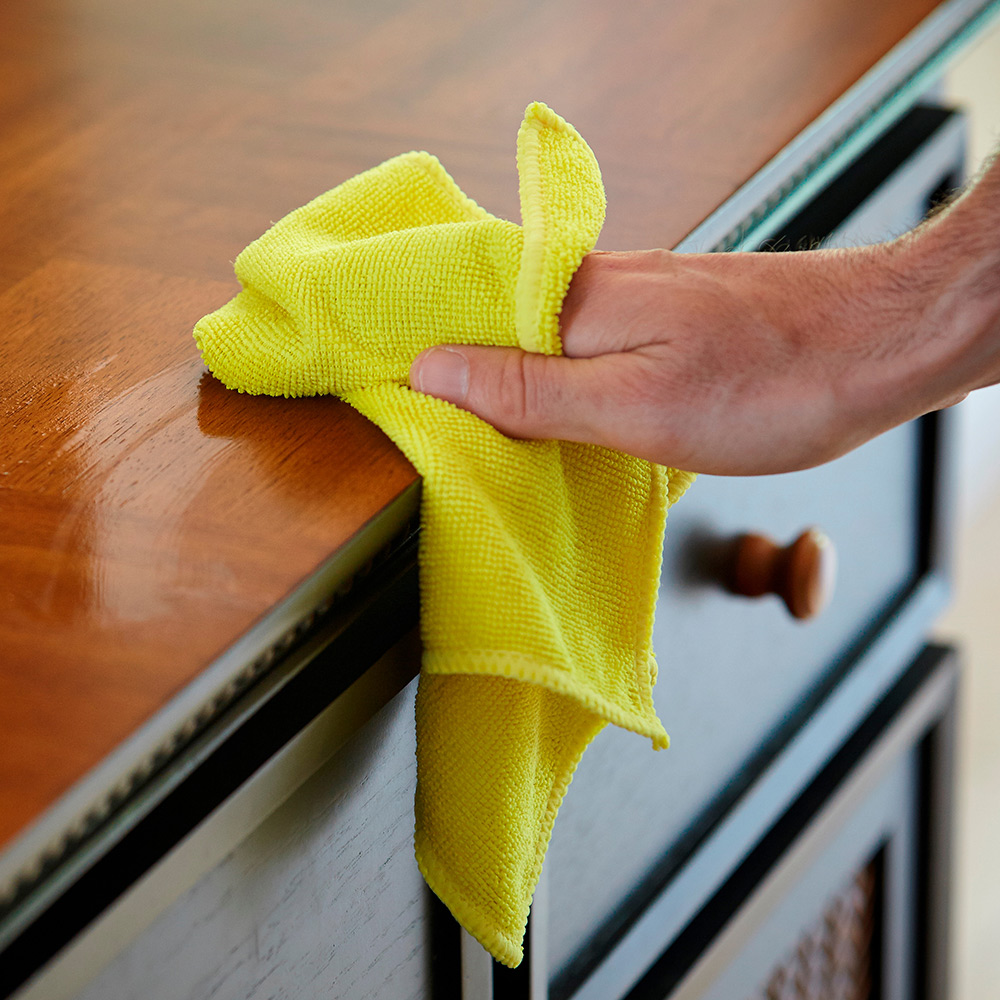
Credit: www.homedepot.com
Identifying Types Of Microfiber Cloths
Before tossing microfiber cloths into the washing machine, know their types. Different uses and weaves affect cleaning methods.
Categories Based On Use
Microfiber cloths serve various purposes. Some categories include:
- Cleaning cloths: for household chores.
- Automotive towels: for cars, bikes.
- Electronic wipes: for screens, gadgets.
Understanding Weave And Density
The weave and density of a microfiber cloth dictate its use. A table illustrates the differences:
| Use | Weave | Density |
|---|---|---|
| Cleaning surfaces | Flat | Light |
| Polishing | Waffle | Medium |
| Detailing | Terry | High |
Choose the right cleaning method based on these attributes. This ensures a long life for your cloths.
Preparing Microfiber For Washing
Let’s talk about Preparing Microfiber for Washing. Keeping your microfiber cloths clean ensures they last longer and work better. Here’s how to get them ready for the washing machine.
Removing Excess Dirt
Before washing, it’s crucial to remove loose dirt. This prevents the dirt from spreading to other cloths during the wash. Here’s a simple way to do it:
- Shake the cloth well outdoors or over a trash can to get rid of visible dirt.
- For tougher dirt, rinse the cloth under cold water. Use your hands to help remove the dirt.
- After rinsing, wring the cloth out to remove as much water as possible.
Pre-treatment For Stains
Stains can be stubborn. Pre-treating them ensures they don’t stay on your cloths. Follow these steps:
- Identify any stained areas on your microfiber cloth.
- Apply a small amount of mild detergent directly to the stain.
- Using a soft-bristled brush, gently scrub the stain.
- Let the cloth sit for about 5-10 minutes before washing.
:max_bytes(150000):strip_icc()/how-to-clean-microfiber-1900708-04-042d7adbd92a44a286921086be14e20b.jpeg)
Credit: www.thespruce.com
Selecting The Right Detergent
Keeping your microfiber cloths clean is key. Selecting the right detergent is crucial. The wrong one can damage the fibers. Let’s dive into which detergents to use and avoid.
Detergents To Avoid
- Bleach: Harms microfiber’s effectiveness.
- Fabric Softeners: Coat fibers, reducing absorbency.
- Powder Detergents: Leave residue on cloths.
Recommended Detergents For Microfiber
Choose the right detergents for a gentle, effective clean. Here are our top picks:
| Detergent Type | Features |
|---|---|
| Liquid Detergents | Rinse clean, leaving no residue. |
| Free & Clear Detergents | No dyes or perfumes. Safe for sensitive skin. |
Remember, a small amount does the job. Avoid overloading.
Machine Washing Settings
Proper machine washing settings ensure your microfiber cloths stay effective. Let’s explore the best practices.
Temperature Guidelines
Keep temperatures low to protect fibers. Hot water can damage microfiber, reducing its cleaning power.
- Use cold or warm water, ideally below 40°C (104°F).
- Avoid bleach and fabric softener, as they can ruin the cloth’s texture.
Cycle Selection
Select a gentle cycle to maintain cloth longevity.
| Cycle Type | Description |
|---|---|
| Normal | Suitable for lightly soiled cloths |
| Delicate | Best for preserving cloth condition |
Avoid high spin speeds which can stretch the fibers.
Rinse thoroughly to remove all detergent.
Dos And Don’ts During The Wash Cycle
Cleaning microfiber cloths in a washing machine needs care. These tips ensure a thorough clean without damaging the fabric. Follow these dos and don’ts for a successful wash cycle.
Items To Keep Away From Microfiber
Microfiber cloths need protection during the wash. Certain items can cause damage or reduce effectiveness.
- Avoid mixing with cotton or terry cloth.
- Keep away from lint-producing fabrics.
- Do not include zippers or hooks that can snag.
Balancing The Load
Washers work best with balanced loads. This prevents damage and ensures an even clean.
- Place similar weight items together.
- Even out the drum with equal-sized cloths.
- Small loads can use a few towels for balance.
Using these tips, your microfiber cloths will come out clean and intact.
Drying Microfiber Cloths
Once your microfiber cloths are clean, drying them properly is key to maintaining their effectiveness. This section focuses on how to dry microfiber cloths to ensure they stay in top condition.
Air Drying Versus Machine Drying
Drying microfiber cloths right saves them from damage. Let’s compare air drying and machine drying.
- Air drying is safe and energy-efficient.
- It prevents heat damage and maintains cloth integrity.
- Machine drying saves time.
- It needs proper settings to avoid cloth shrinkage.
Settings For Machine Drying
Choose the right machine settings to protect your cloths. Follow these tips:
| Setting | Instruction |
|---|---|
| Heat | Use a low or no-heat option |
| Time | Short cycles prevent over-drying |
| Tumbling | Gentle tumbling keeps fibers intact |
Remember to remove cloths as soon as they’re dry.
Post-wash Care For Microfiber
After washing microfiber cloths, proper care is crucial. This ensures they remain effective for cleaning. With the right post-wash care, these cloths can last for many uses. Let’s explore the best practices for folding, storing, and maintaining your microfiber cloths.
Folding And Storing
- Allow to air dry: Microfiber cloths dry quickly. Avoid using a dryer.
- Fold neatly: This prevents wrinkles and maintains cloth shape.
- Store in a clean, dry area: Protects from dust and dirt.
- Separate from other cleaning materials: Prevents cross-contamination.
Maintaining Cloth Performance
- Avoid fabric softeners: They clog the fibers, reducing effectiveness.
- Do not iron: High heat can melt the fibers.
- Inspect for wear: Replace if the cloth becomes less effective.
- Use for appropriate tasks: Ensures longevity of the cloth.
Troubleshooting Common Issues
Cleaning microfiber cloths in a washing machine sometimes faces issues. Let’s troubleshoot these for effective cleaning.
Dealing With Residual Lint
Microfiber cloths can attract lint. Before washing, shake them out. Always wash microfiber separately to prevent lint from other fabrics.
- Use a lint roller to remove excess lint before the wash.
- Wash with like-textured items to avoid lint transfer.
Check the washer’s lint trap. Clean it out regularly for lint-free cloths.
Restoring Absorbency
Over time, microfiber cloths may lose absorbency. This is often due to fabric softener or incorrect drying.
- Avoid fabric softeners; they coat fibers, reducing absorbency.
- Use warm water for washing to open up fibers.
- Rinse thoroughly to remove all detergent.
To restore, wash with a vinegar solution (half a cup of vinegar to one gallon of water). Then, dry on low heat or air dry.
Eco-friendly Tips For Washing Microfiber
Cleaning microfiber cloths in eco-friendly ways is easy. This guide shows how to keep cloths clean and the planet green. Follow these simple tips for an environmentally safe wash.
Using Green Detergents
Choose detergents with natural ingredients. These are gentle on fabrics and the environment. Look for labels that say “biodegradable” and “phosphate-free”.
- Bold the brand when choosing a green detergent.
- Check for eco-certifications.
Conserving Water And Energy
Save water and energy with these steps:
- Wash microfiber cloths in full loads.
- Select a shorter wash cycle for less soiled cloths.
- Use cold water settings to reduce energy.
Consider air-drying cloths. This saves energy and maintains cloth quality.
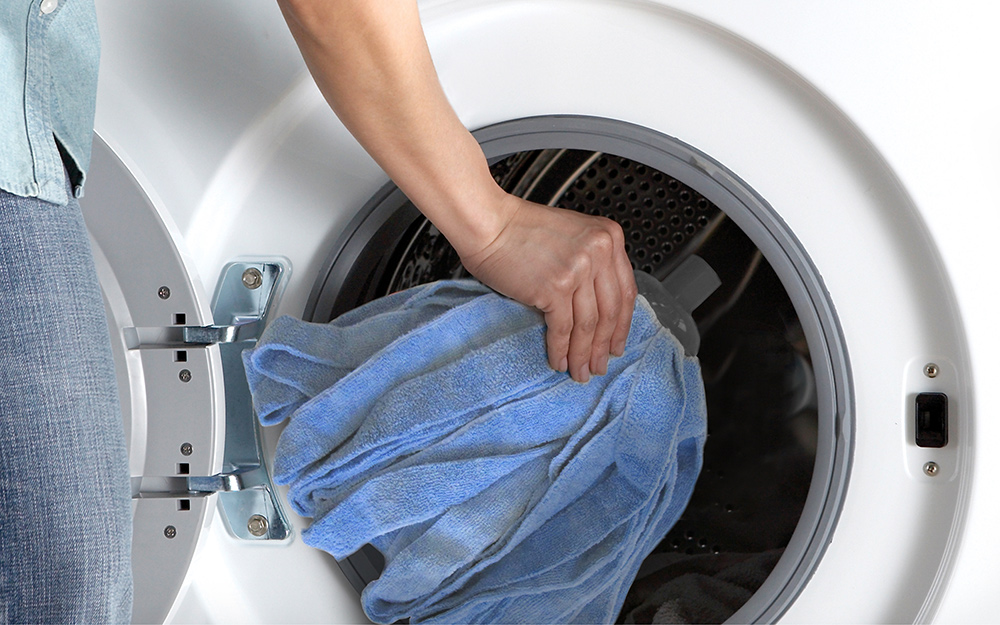
Credit: www.homedepot.com
Frequently Asked Questions
Can Microfiber Cloths Be Machine Washed?
Yes, microfiber cloths can be safely machine washed. Use a gentle cycle with warm water and a mild detergent. Avoid fabric softeners and bleach to maintain the cloth’s cleaning effectiveness.
What Is The Best Way To Dry Microfiber Cloths?
The best way to dry microfiber cloths is by air-drying them. If you use a dryer, set it on low heat or no heat. High temperatures can damage the fibers and reduce their effectiveness.
How Often Should You Wash Microfiber Cloths?
Microfiber cloths should be washed after each use to prevent the buildup of dirt and bacteria. Regular washing helps maintain their cleaning efficiency and prolong their life.
Can You Wash All Microfiber Cloths Together?
Yes, you can wash all microfiber cloths together. However, avoid mixing them with other fabrics, especially cotton, as lint transfer can occur, diminishing the cloths’ cleaning capabilities.
Conclusion
Cleaning your microfiber cloths properly extends their lifespan and effectiveness. By following the steps outlined, you ensure a thorough wash without damaging the fibers. Regular maintenance using your washing machine keeps microfiber cloths at peak performance. Embrace these tips for spotless results every time you clean.
